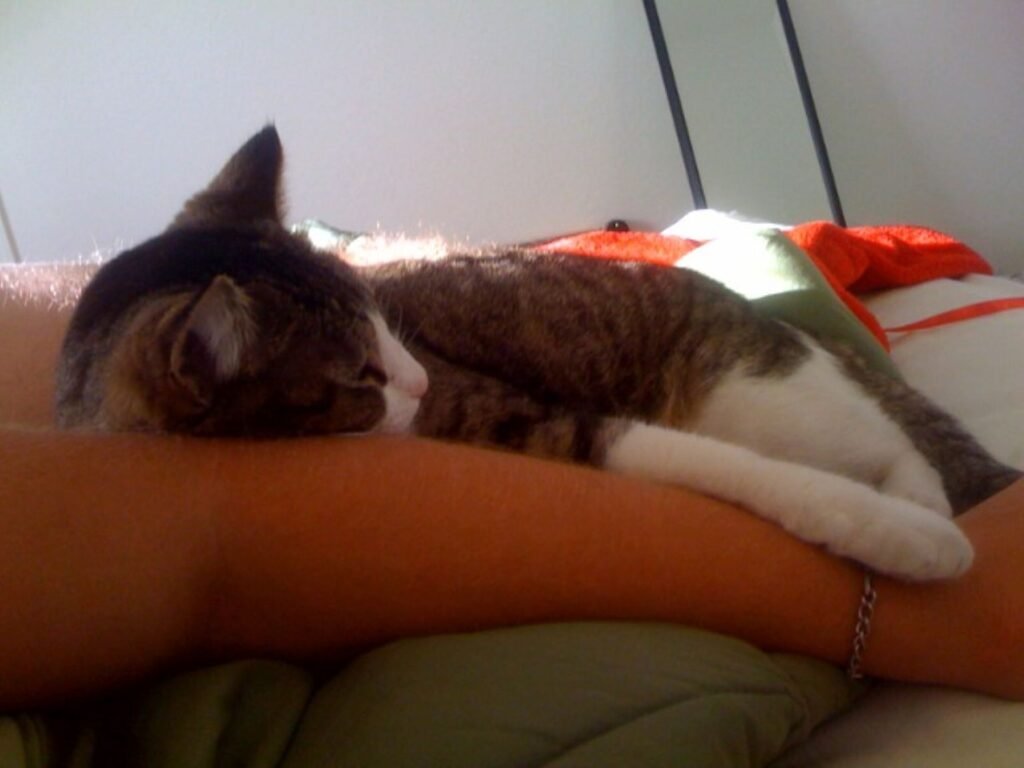Picture this: you’re ready to slip into bed after a long day when your feline companion decides your pillow looks perfectly suitable for their evening nap. Your cat’s purring fills the room, their warm body presses against your side, and for a moment, everything feels wonderfully peaceful. Yet as comforting as this scenario might be, you can’t help but wonder whether sharing your bed with your furry friend is actually a good idea.
Research indicates that about half of pet owners – mostly dog or cat owners – allow their animals to sleep in their bedrooms. This age-old debate between pet owners has raised important questions about health, sleep quality, and the bond between humans and their cats. Let’s dive into the fascinating world of sleeping with your feline companion and uncover what science really tells us about this cozy arrangement.
The Psychological Benefits of Sleeping With Your Cat

Your cat’s presence in bed might be doing more for your mental health than you realize. Pets protect against loneliness, anxiety, and depression. A survey by the Human Animal Bond Research Institute found that 85 percent of pet owners experience less loneliness because of their pets. Think about those moments when your cat instinctively knows you’ve had a rough day and curls up beside you. That’s not just coincidence.
Reduced stress: Snuggling with your pet can help you relax and reduce stress levels, which can lead to a better night’s sleep. Improved mood: Spending time with a pet has been shown to increase levels of oxytocin, a hormone that promotes feelings of happiness and well-being. The simple act of feeling your cat’s rhythmic breathing against your body can create a sense of security that’s hard to replicate any other way.
Your Cat’s Sleep Patterns and What They Mean for You

Understanding your cat’s natural sleep behavior is crucial before making any bedtime decisions. Cats are crepuscular, which means they’re most active at dawn and dusk (the best times for hunting in the wild). Although today’s cats are domesticated, that instinct remains strong. This means your perfectly peaceful sleeping partner might suddenly transform into a midnight acrobat.
On average, cats sleep between 13 and 16 hours in a 24-hour day; that’s roughly twice the amount that their human owners require. Although this does vary depending on age and personality, your cat will certainly spend far more time napping than you. However, their sleep isn’t like ours. Rather, they sleep and wake frequently throughout the day and night. This is because cats in the wild need to hunt as many as 20 small prey each day; they must be able to rest between each hunt so they are ready to pounce quickly when prey approaches.
The Science Behind Sleep Quality When Sharing Your Bed

Recent research has revealed some surprising findings about how cats affect our sleep. Extending these findings, we found that cat owners exhibited an increased risk of sleeping too short. Cats can display crepuscular behaviour, i.e., they are primarily active at dawn and dusk. Consequently, when co-sleeping with a cat, the owner’s sleep might become disrupted. This doesn’t necessarily mean you’ll feel tired, though.
When sleep researchers use objective methods of studying sleep in a laboratory, the results indicate the quality of sleep decreased. But subjectively, ask pet owners about sleeping with their pet, and they give it a thumbs up. Interestingly, 93% of people in our study who co-slept with their pets believed that their pets had either a positive or neutral overall effect on their sleep. Although more research is needed, these findings could suggest that most people are unaware of the potential negative effects their pets may have on their sleep.
Health Risks and Zoonotic Diseases You Should Know

While cuddling with your cat feels wonderful, it’s important to understand the potential health risks. Those at the highest risk of contracting a disease from a cat are those with behaviors that include: being licked, sharing food, sharing kitchen utensils, kissing, and sleeping with a cat. The risks aren’t enormous, but they do exist.
Fleas are the most common infectious agent found, and they can carry a variety of diseases transmissible to humans such as cat scratch disease and plague. The results of this study might give pet owners a reason not to sleep with their pet; however, the use of excellent flea and tick preventatives make sleeping with your pet much safer. If your cat is an outdoor cat, or if you let your indoor cat outside for small periods of time, there is a likely chance that they could contract a parasite called Toxoplasma gondii. This parasite is most commonly contracted by humans when they cuddle up with their cats during bedtime. When infected, this parasite leads to an infection called toxoplasmosis which can cause headaches, chills, a fever, and even neurological problems.
Physical Comfort Versus Sleep Disruption

The relaxing effect of interacting with a pet appears to be at least partially due to physical touch, so snuggling with your dog can ease the mind and promote tranquility. Your cat’s warm presence can be incredibly soothing, especially during cold winter nights. Many people find the gentle vibrations of purring particularly calming.
However, there’s a flip side to consider. Some pets, especially larger ones, are prone to sprawling out and taking up more than their fair share of bed space. Sleep disturbances when sharing a bed may vary depending on the type of pet. In one study, women who shared a bed with a dog reported less disturbed sleep than those who shared a bed with a cat. Your sweet tabby might decide that your head makes an excellent pillow at three in the morning, or that your moving feet under the blankets need immediate investigation.
The Immune System Benefits You Might Not Expect

Here’s where things get interesting from a health perspective. The moment you invite dogs or cats into your home, this significantly impacts the types of bacteria found in your home. This, in turn, impacts your immune system. When you’re exposed to different bacteria and allergens, this benefits your immune system by building its resistance to a variety of different allergens and bacteria. Think of it as a natural immunity boost.
The presence of dogs or cats significantly influences the makeup of bacteria found in a home, which in turn can impact the immunity of humans living there. Researchers hypothesize that exposure to a diversity of microorganisms benefits human health and strengthens immunity. The presence of a pet may be even more beneficial to the developing immune systems of children and infants. This might explain why some children who grow up with pets seem to have fewer allergies.
Special Considerations for Vulnerable Populations

Not everyone faces the same level of risk when sleeping with cats. The very young, the elderly and those who are immunocompromised increase their risk of becoming infected when sleeping with their cats (and dogs). If you fall into any of these categories, you’ll need to weigh the risks more carefully.
Most healthy adults have a very low risk of catching a zoonotic disease from their cat. Babies, children, pregnant women, immunocompromised people, and elderly people have increased risk and should take extra precautions depending on their individual circumstances. I would caution against sleeping with a puppy or kitten because you could roll onto the little creature and crush or suffocate it. Young kittens are particularly vulnerable and need special protection.
Making the Best Decision for Your Situation

For healthy cats and owners, the benefits outweigh the potential risks. The decision ultimately comes down to your personal circumstances, health status, and sleep preferences. If you would like to minimize sleep disturbances, researchers have found that having the dog sleep elsewhere in the bedroom, such as a cozy bed of their own, can make your slumber a bit more peaceful.
Consider creating a compromise that works for both you and your feline friend. My personal recommendation is that if you absolutely can’t kick your cat off your bed at night because you feel too bad, train them to sleep at the edge of your bed instead. This way they are off your chest, not right next to your head, or laying over your legs. This will prevent you from consuming as much pet dander and you won’t have direct contact with your cat’s body. You could also set up a comfortable cat bed near yours, giving them the security of your presence without the potential disruptions.
The truth about sleeping with your cat isn’t black and white. While there are legitimate health considerations and sleep quality factors to weigh, the emotional and psychological benefits can be substantial for many people. The key lies in understanding your own health status, maintaining good hygiene practices, and ensuring your cat receives regular veterinary care. Whether you choose to share your bed or create a cozy alternative nearby, the most important thing is that both you and your feline companion get the rest you need. What’s your experience been with your cat’s nighttime habits? Have you found the perfect sleeping arrangement that works for both of you?






